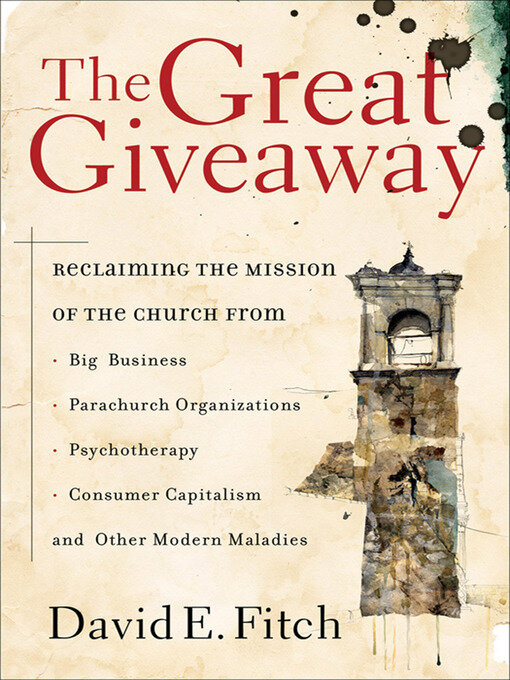David Fitch, The Great Giveaway: Reclaiming the Mission of the Church from Big Business, Parachurch Organizations, Psychotherapy, Consumer Capitalism, and Other Modern Maladies. Baker Books, 2005.
Referenced in:
LifeandLeadership.com Summary
Theology of Mission and Ministry.
Summary: The Great Giveaway is an excellent example of a contextualized ecclesiology, exploring God’s intent for the church in a specific cultural setting, in our case Western society generally and North America particularly. This is one of the best windows into the current disillusionment toward the modernistic “bodies, buildings, and budgets” criteria for effective church life. It is a scholarly, probing, and reasoned critique of how churches have adopted corporate models, consumer-oriented practices, and capitalistic assumptions to the point of blurring, and at times removing the identity of the church.
Fitch entertains issues such as how we define success, suggesting that “moving from ten to a thousand members in five years may be the sign of a sick church.” (27) He discusses the true nature of evangelism and discipleship over against the “gospel as attractive, professional, and successful.” (55). He describes the waning effectiveness of evidentiary apologetics, and proposes a renewed focus on a “lived out” apologetic where “the truth of the gospel is worked out in the real lives of people living together in community.” (55) He reemphasizes the moral character of church leaders, and attributes the increase in moral failures partly to an “individualistic theology of sanctification” that “isolates the pastor from the very body that the Spirit uses to help one grow and overcome moral deficits, which surely exists in all pastors unto death.” (85) He encourages churches to move worship beyond the “experience” of seeker-services that “initiate converts into a Christianity that forms them to be self-seeking,” toward a “worship that forms truthful minds and faithful experience (not merely reinforces the ones we walked in with).” (95) He challenges the primacy of expository preaching and encourages narrative-based preaching that although “progressing orderly through the text,” does not “examine the grammar of each verse, word for word, sentence for sentence.” Instead, it focuses on “one, at most two, crucial exegetical points and uses them to illumine the world of the text we might have missed otherwise.” From there, preaching should invite the hearers to “see the world out of Scripture and to ask what kind of faith, confession, obedience, and submission this requires of us.” (149) He provides a convicting description of our often feigned profession of social justice on a scale that can “get enthusiastic about volunteering at a local soup kitchen…or walking miles to raise funds for pro-life and anti-poverty campaigns” but cannot discern justice and mercy for a member of its faith community that will die of cancer because she does not have health insurance to pay for an expensive operation. (154) In the same manner, Fitch looks incisively at issues such as spiritual formation, therapy, and moral education.
One reviewer says Fitch has provided “a stern but truthful diagnosis of the state of evangelicalism’s captivity to America.” Not all who read Fitch will agree with the full range of his argument, but no one can deny we are living in a time of seismic change in which a generation of believers is completely, and in many ways refreshingly, rethinking “church.” Anyone interested in church renewal will benefit from this text. Intellectual and spiritual honesty will force you to thank the author for what he offers.
From the Publisher
“North American evangelicals learned to do church in relation to modernity,” asserts David Fitch. Furthermore, evangelicals have begun to model their ministries after the secular sciences or even to farm out functions of the church whenever it seems more efficient. As a result, the church, too often, has stopped being the church. In The Great Giveaway, Fitch examines various church practices and shows how and why each function has been compromised by modernity. Discussing such ministries as evangelism, physical healing, and spiritual formation, Fitch challenges Christians to reclaim these lost practices so that the church can regain its influence. Pastors, leaders, and students who minister to the postmodern world will find in this book fresh insight that will stir the hearts of many and spark much-needed discussion about the evangelical church.
Editorial Reviews
A new crop of leaders is emerging. The Great Giveaway cuts a clear path into the future. -Robert Webber, author of Ancient-Future Faith
A stern but truthful diagnosis of the state of evangelicalism’s captivity to America. – Stephen Fowl, author, Engaging Scripture
Dr. Fitch offers an important work for evangelicals who seek hope for the church beyond pragmatics and culture wars. – Brian McClaren, author and pastor
His analysis is trenchant and motivated out of love for the body of Christ. He deserves a hearing. – Gerry Wisz, Aspiring Retail
This book will provide an alternative to the failure of imagination on the part of many Christians in our society. – Stanley Hauerwas, Duke Divinity School
About the Author
David Fitch (Ph.D., Northwestern University) is pastor of Life on the Vine Christian Community of the Christian and Missionary Alliance in Long Grove, Illinois, and is Affiliate Professor of Christian Ethics at Northern Seminary.
***For additional information on this resource, including reviews, click the bookstore links. Check the reference at page top or the links below for resource guides on related topics.***
Related Areas
Related Ministry Resource Guides:
- Missional Church Resources, Introduction and Index
- Missional Philosophy
- Theology of Mission
- Missional Communities
- Missional Leadership / Missional Strategies
- Missional Lifestyle, Discipleship, Spirituality
- Church Leadership and Renewal, Index to Resources
- Ecclesiology
- Evangelism
See Resources on Over 100 Areas of Ministry Leadership:


